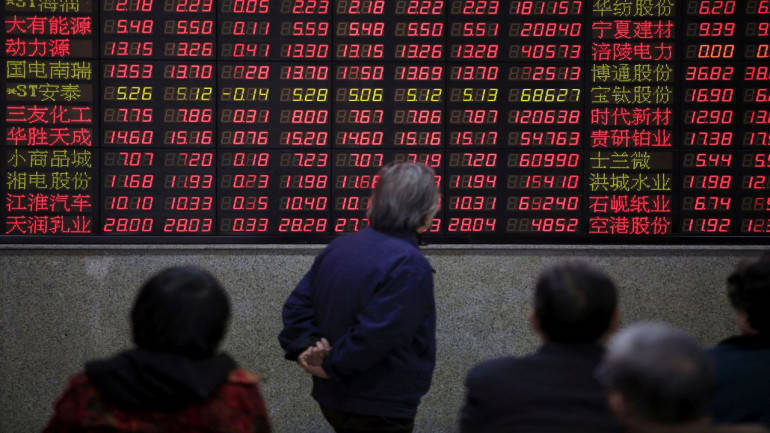Asian Stocks Subdued
July 27, 2018 | Expert Insights

Asian stocks struggled to gain traction on Friday, following a mixed end to Wall Street trade. The worsening Sino-U.S. trade dispute kept investors in the region cautious, despite signs of rapprochement between the US and Europe.
Background
Historically, while the Asian markets have had stock exchanges for more than 100 years, they did not rise to prominence until after World War II. Japan set the pace with protectionist policies, and a strong central-government-led development effort that turned the country into an exporting powerhouse.
In time, a host of other nations, including Hong Kong, Singapore, South Korea, Taiwan, Vietnam, Thailand, India and China, began a period of rapid industrialization in the early 1960s that continued through the 21st Century. These nations entered the global marketplace by exporting mass-produced products and then, over time, many of them evolved their efforts to enter the high-tech arena.
The ongoing US- China trade war started last month when the White House announced plans to stick 25% tariffs on 1100 Chinese goods. Beijing has vowed to retaliate with the same value: 25% tariffs on US products worth $34 billion per year. Each side has threatened further tariffs on the other and tensions continue to escalate, sparking fears of an all-out ongoing global trade war.
Recently, the US tariffs on an additional US$200 billion worth of Chinese goods sent Asian stocks tumbling. However, the Yen appreciated against a number of peers.MSCI's broadest index of Asia-Pacific shares outside Japan fell 1.5%.Hong Kong's Hang Seng slid 2.2% and the Shanghai Composite Index slumped 2.4%.The yen gained against a number of peers.The dollar was down 0.1 % at 110.88 yen, pulled back from a near two-month peak of 111.355.
President Donald Trump and European Commission President Jean-Claude Juncker met in Washington this week for trade negotiations. They announced the broad outline of an agreement designed to limit escalation of a looming trade war. Both leaders seemed pleased with the deal with Trump dubbing it a “new phase” of relations between the two trading partners.
Analysis
MSCI’s broadest index of Asia-Pacific shares outside Japan pared slight losses in early trade.Japan’s Nikkei edged higher by 0.24% though it was capped by worries that the Bank of Japan could scale down its asset purchase at its upcoming policy review next week.The EU and the US recently agreed to negotiate on trade, this move has eased fears of a transatlantic trade war and led to MSCI’s stocks across the globe hit four-month highs.
However, the Asian shares were more subdued as trade disputes between US and China have shown few signs of abating.“Now that Washington does not need to use its energy to fight with Europe, it could increase pressure on China,” said Nobuhiko Kuramochi, chief strategist at Mizuho Securities.The Chinese yuan stayed near its 13-month low touched earlier this week.The Thomson Reuters/HKEX Global CNH index, which tracks the offshore yuan against a basket of currencies on a daily basis, fell to its lowest levels since May last year, having fallen 2.7% so far this month.
A lack of certainty on progress is likely to remain when it comes to U.S.-China trade relations. Shane Oliver, head of investment strategy at AMP Capital said "After 'wins' in relation to North Korea and Europe, Trump will no doubt see vindication of his 'maximum pressure' negotiating stance – which will embolden him to continue with his tough trade stance on China.”
Markets in China were little changed, with the Shanghai Composite lower by 0.06 % and the Shenzhen Composite pulling back by 0.29%. In Hong Kong, the Hang Seng Index eased 0.04%, off its intraday low, as gains in materials and property stocks were offset by declines in services and utilities.Singapore Airlines dropped 5% after the company reported net profit came in at 140 million Singapore dollars for the quarter just ended, below the S$337.9 million figure one year ago.
U.S. stocks were mixed overnight, with technology taking a beating after Facebook reported a miss in second-quarter revenue after the market close on Wednesday. The decline in tech saw the Nasdaq Composite recording its worst day in around a month, falling 1.01 percent to 7,852.19, although other U.S. indexes were steadier.Meanwhile, the euro inched slightly higher after its overnight stumble when the European Central Bank kept its policy unchanged.The dollar ticked up to 111.22 yen after hitting a low of 110.58 yen the previous day, its lowest level in more than half a month, in part helped by a rise in U.S. yields.
Assessment
Our assessment is that Asian markets have reacted more cautiously to the EU-US trade war ceasefire. We feel that the Bank of Japan in its upcoming policy review must do away with sustained ultra-loose policy as it could generate unwelcome financial risks. We believe that as the US-China trade war has shown few signs of abatement, the Asian stocks will continue to be varied.








Comments